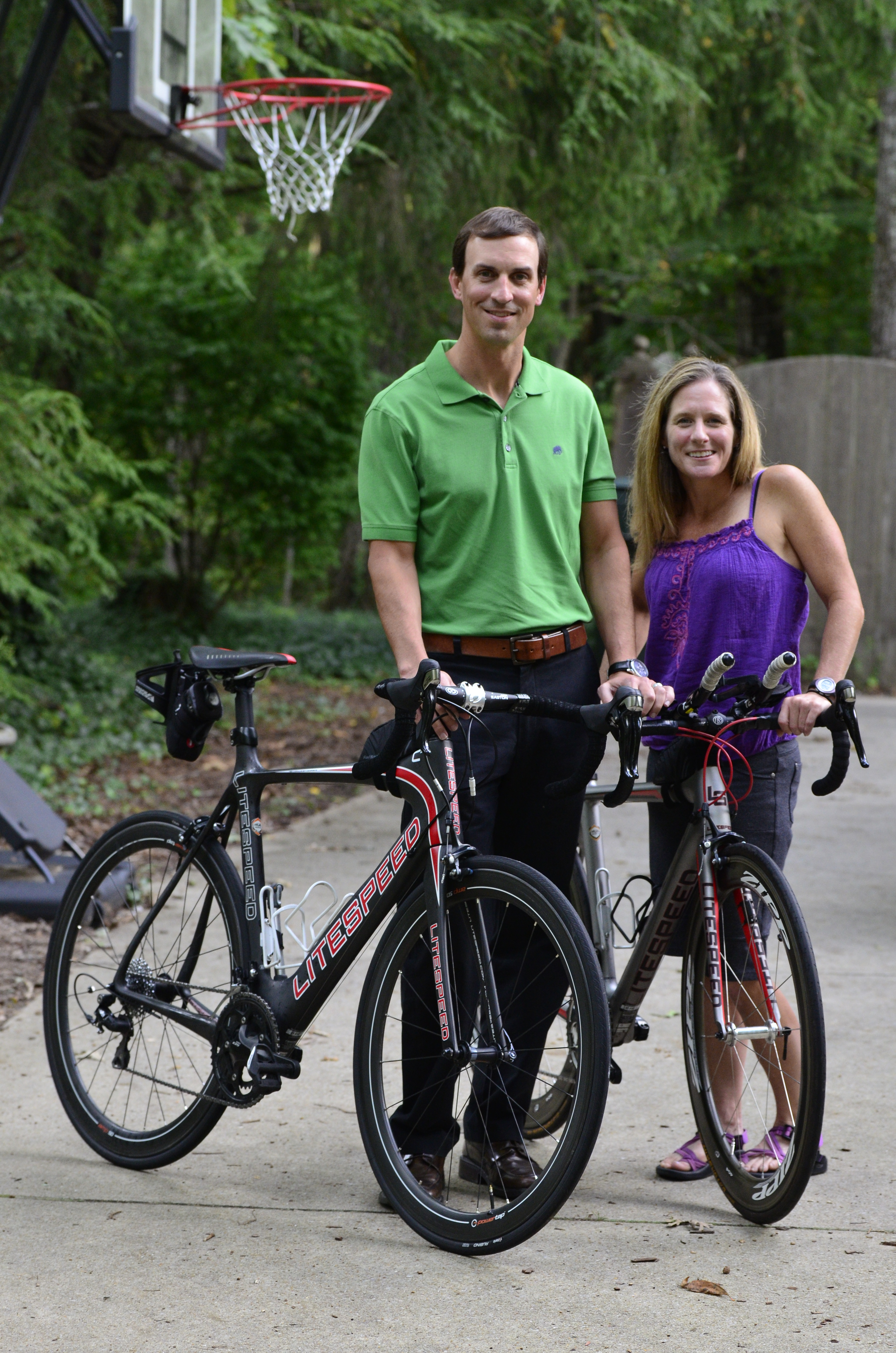Elizabeth Baker can't see too well.
A disease called Stargardt's has turned her eyesight into 50 shades of gray. In the grocery store, she can't tell the Trix from the toilet paper. Menus are impossible. She'll cut the grass, and mow the same strip twice. Her Kindle font is billboard.
She sees faces, kind of.
"Once, she waved at a scarecrow," said her husband, Brian.
"What you are seeing at 200 feet, I see at 20," she said.
This, as you may imagine, can be a real pain. She can't help her kids choose library books. Has to pull the chair inches from the TV. The only glasses that help are these clunky telescopic things, like what heart doctors wear during surgery.
But you know when being almost-Ray Charles is really tough?
When Elizabeth goes on a bike ride. For five hours. On her Litespeed. Across valleys, up mountains and down the other side.
Or when she's swimming in the river.
Or on a 20-mile run.
You see, Elizabeth Baker -- the Signal Mountain woman who's legally blind -- is a triathlete.
And in 17 days, she's competing in Ironman Chattanooga.
"I've always wanted to do one," she said.
Always wanted to ... what?!? Come again? You can't see potholes. Can't see buoys in the river. Can't ...
"Nope," said Brian. "Those two words -- I can't -- don't exist for her."
Stargardt's, which scars the retina, hit her in high school in Atlanta, but got bad when she was at the University of Georgia. Her 20/40 eyesight plummeted to 20/120, then 20/just this side of Braille.
Her professors would lecture, but she couldn't see the board.
Two things happened.
She learned to let go of pity. ("Every now and then, I'll tell myself: all right, [I've] got an hour to feel sorry for myself," she said. "Then get over it.")
And Elizabeth -- who works as a physical therapist -- began to adapt.
"When everybody else was looking at the board, I learned to listen," she said.
She identifies people more by their voices than faces. She's gotten so graceful at adapting -- she'll wave, even though she's not quite sure who she's waving to -- that many friends, until now, don't even know.
"It embarrasses her a little bit," said Brian. "But more importantly, she doesn't want it to define her in any way."
Yes, it hurts, too. She can't read bedtime stories to her kids, Andrew and Eliza. Can't spot them from the sidelines during soccer games. ("I might break out the binoculars," she said, smiling.) Her dream is to be able to see her kids' faces, in full detail, every freckle, every little crease.
But over time, Elizabeth realized that Stargardt's took most of her sight, yet left something quite shimmering in return.
"It's made me who I am," she said.
That's what struggle does. Just ask any triathlete.
"I did my first sprint triathlon in 2003," she said. "I crashed three times."
Then, another triathlon. A third. Three marathons. The Waterfront earlier this summer.
And every time she crashed, she got back up.
"I'm very proud of her," said Brian, tears in his eyes.
She's been training with Andy Sweet at HUB Endurance and across-the-street neighbor and best-bud Eden Lusk.
(Once, she and Eden were riding the race course, just past the spot where someone has set out a little Ironman-esque statue. Elizabeth thought it was a real person and waved. A few moments passed. "He wasn't real, was he?" Elizabeth said. "No," said Eden, laughing, "but I wasn't sure whether or not to tell you.")
On race day, here's the plan:
During the swim, Elizabeth will be guided by a kayaker or stand-up paddleboarder, who'll keep just to her right.
During the run, she'll be unassisted. ("I go so slow," she said, "I can see any obstacle.")
And during the bike? Oh, this is where her story gets even more beautiful.
"I will be guiding her," said Brian.
They've been training together for six months: she keeps her bike just a few feet behind his, and he'll wave an arm or shout over his shoulder:
"Pothole!"
"Dog on your left!"
"Train tracks coming!"
It is one thing to ride 75 miles on a Saturday. It is quite another to do it without being able to see 10 yards in front of you, while trusting in your spouse to guide you through any and all troubles -- like going down hill at 30 mph.
"And she's telling me to go faster," said Brian, who graduated from Baylor School in 1994 and works at Unum.
Early on, Brian realized the crux of race day.
"Her bike ride is dependent on the success of my bike ride," he said.
Think of it: those two-lane country roads, surrounded by hundreds of cyclists, trusting in someone else, leaning forward into the race, even though the path ahead is unclear.
It's not just the Ironman. It's life.
"My struggle is small in comparison to others," Elizabeth said. "I hope somebody reads this and can put their fear aside and just go for it."
If only we could all see the world like she does.
Contact David Cook at dcook@timesfreepress.com or 423-757-6329. Follow him on Facebook and Twitter atDavidCookTFP.


